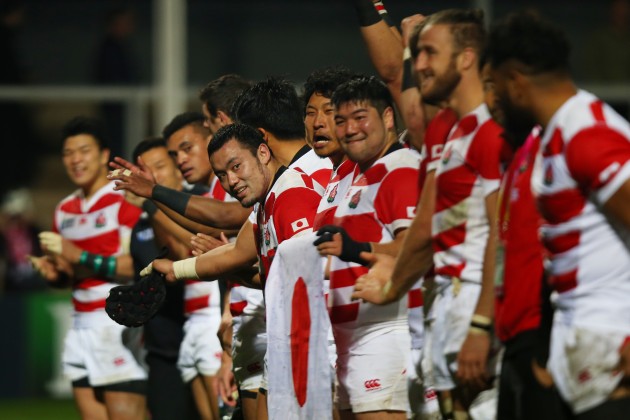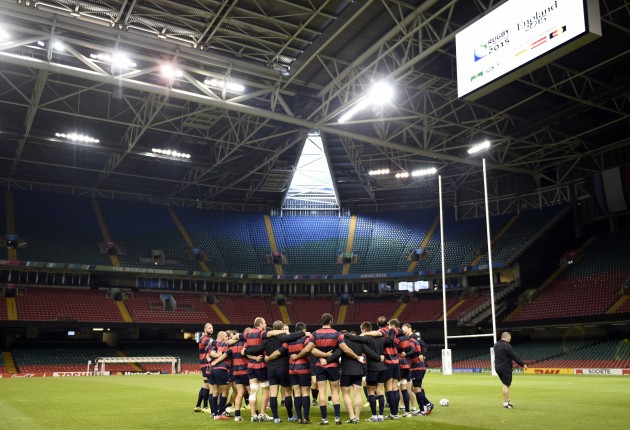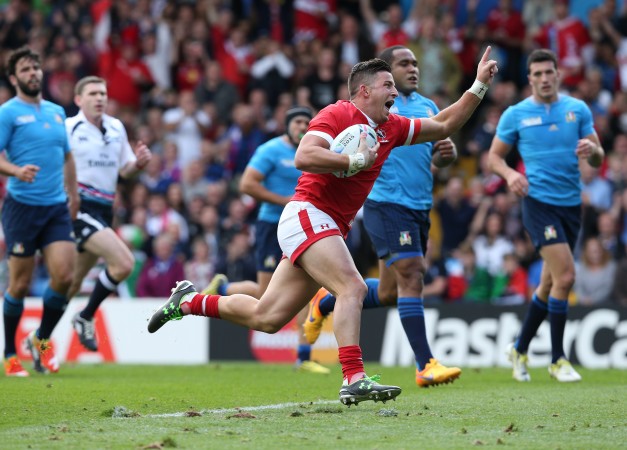Tier 2 nations have made a huge impression on this year's World Cup so it's about time they started being treated on a par with Tier 1 nations
By Will Macpherson
Sadly, we’ve bid farewell to Japan, Georgia, Uruguay, USA and the rest of the Rugby World Cup’s smaller teams. They lit up the tournament with their upsets, their committment and their sheer unbridled joy.
With them, though, I want to send a pejorative, patronising and inward-looking word that’s use does our sport no favours: minnow. I’m deeply shocked at how much the word has continued to be used. Why? For starters, here’s the dictionary definition:
Minnow
noun
- a small freshwater Eurasian fish of the carp family, which typically forms large shoals.
- a small or insignificant person or organisation.
Now I understand that on the list of problems that these teams face, what we call them probably pales in comparison to the chronic lack of funding, the small player pools, the reluctance of the big boys to tour or host them and the fear that those nations might attract their best players. That’s before we get on to the shambolic, flawed judiciary process and the lop-sided World Cup schedule that sunk some of them. But “small and insignificant”? Really? Tugby is, better than that, surely. It’s not “them” and “us”. They are international rugby teams too, not pub sides.
The fact that rugby is tiered is bad enough. That the ten Tier One nations are ring-fenced in their elite competitions and the 13 in Tier Two (let alone the serfs in Tier Three!) are forced to feed off scraps between World Cups is unquestionably detrimental to their development. Meanwhile, World Rugby and the top nations benefit commercially and competitively. In both hemispheres, based purely on rugby merit, there are major cases for expanded competitions involving more nations – it’s promising to hear USA is in the throes of starting a six-team professional league. Cosiness and logistics currently hold that back. If the situation is unfair, it is unquestionably exacerbated by the patronising language used by the haves towards and about the have-nots.
That’s not to say rugby union is not doing better than other sports and doing better than it ever has before at growing the game, and that there is not a concerted effort being made to broaden the game’s horizons. There is also absolutely no question that those who are now out performed better than ever before. There was no disgraceful mismatch this time round, and no ritual embarrassment. As a result of their four weeks of nose tweaking, the Tier Two nations have built up a huge bank of goodwill and we are unquestionably closer to expanding the World Cup – and thus making it more of a World Cup – than shrinking it. Rugby’s growth and advancement could neatly be filed as a “qualified success”: lots of things being done well (I mean, one of these “minnows” is currently set to host the next World Cup), plenty more to do.
Interestingly, the term minnow has all but vanished from cricket talk. The ICC are streets behind World Rugby and are even downsizing their World Cup in a bid to pretend their – so dispassionately named – Associate Members (equivalent of Tier Two) and Affiliates (Tier Three) do not exist and will struggle to improve, but that particularly feudal term is on the way out among media and fans. It’s seen as patronising, and a number of players for Associate Nations have gone on the record to say they can’t stand it, as it diminishes their work and achievements and presents them as an underdeveloped rabble.
The term has the same effect in rugby. These players have trained hard, have plenty of fans and are not merely a circus wheeled out every four years for the World Cup, currently their only true oxygen – they want to play more, to win more. When they do win games, the narrative is almost invariably that the “minnow” was “plucky”; perhaps for the first time – in the game’s greatest ever upset – Japan’s win over South Africa focused on the excellent attitude of the winners, not the inadequacies of the felled giants. Long may that continue, because simply putting a win down to “pluck” – or worse “luck” – is an insult to the smaller nations.
Rugby is moving in the right direction, but there’s evidently so much more we can do. Even before inviting them to the two major scheduled annual competitions, the Autumn Internationals are an obvious chance to get them more games against top teams, while the British and Irish Lions should be heading to the Pacific islands in 2017, and so – annually – should the All Blacks and Wallabies. South Africa’s links with Namibia and Argentina’s with Uruguay do not need spelling out. Eventually, perhaps a two or three tiered, five team competition with promotion and relegation is the way forward for Europe, with the same for the Southern Hemisphere, too.
For now, that’s another conversation. Rugby really does need these teams; they bring so much, so let’s pay them the respect they deserve and stop using a term that patronises them and only serves to widen a shrinking gap.








